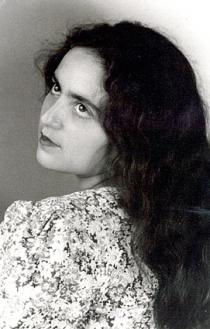My uncle Isaac, my grandmother Riva and my father Abram at my grandmother's birthday in Kiev in 1924.
My grandmother on my father's side Riva finished a religious school. She could read and write, but she didn't know Russian. She spoke a mixture of Yiddish and Ukrainian. She got married when she was 16. Her husband's last name was Stoliar, but later he changed it to Stoliarov. They lived in the town of Penizevichi, Malin district, Kiev province. Her husband was a ruthless man. My grandmother was a nice woman. She was trying her best to get adjusted, but it was impossible. She was strong enough to leave her husband even if it was against her principles as a religious woman. Her husband was to raise their son David according to religious rules.
In 1904-1905 she married Meyer Minovich, a widower. He had two daughters in his first marriage: Zina and Clara. The mothers of the girls died when they were too young and they accepted their stepmother very nicely. My grandmother had 13 children, but only my father and uncle Isaac survived. One boy died after a road accident and other children died from diseases. My grandmother was fanatically religious. She used to say "God gave them and He took them away". She never complained. She prayed every day. My grandmother was a very kind and cheerful woman. In 1918 my grandfather was killed by a shot through the window during one of Petlura's pogroms . He was praying at that time. He was buried in his thales and tfiln at the cemetery in Malin. The whole village came to his funeral. In few days the family moved to Malin in fear of pogroms. In 1921 they moved to Kiev. My grandmother's son from her first marriage David Stoliarov was studying at the Medical Institute in Kiev at that time.
She got married 6 times. She got married for the last time in 1934 when her son Abraham was already married. My grandmother only married religious Jews. Her last husband was a rabbi. I don't know anything about him. He died before the war. How she managed to get married so many times - she looked after single men or widowers. Their relationships developed into attachment and they began to live together.
My father's brother Isaac Minevich was born in 1907. He studied at the cheder and knew Hebrew well. At 12 he began to look for jobs to help his parents. He went from house to house on cold nights purchasing pig bristle from farmers after they had their Christmas pigs slaughtered. He was selling bristle to wholesale traders in Malin. He gave all money he earned to his mother.
When he recovered Isaac returned to Kiev and got a job at the office involved in the paper trade business. He was deputy manager and then became manager. In 1938 he married a Jewish woman from a very religious family. Her name was Tsyupa. In 1929 their son Marek was born. Their son Dania was born in 1937 and their younger daughter Rina was born in 1939. Isaac was summoned to the army in the first days of the war in 1941. He was sent to the Kiev food supplies center. In the first months of the war this center was near the front, but after half of its stuff was killed or wounded at the Gotiy station, it was transferred to the Gorky station in Russia. He served there until the beginning of 1946. Isaac's wife and their children and parents were in the evacuation in Tashkent.
I know little about my father Abraham Minevich. He was born in 1909. He finished school in Kiev and worked in an office in Kiev. He was very kind and loved my mother, my brother and me very much. That's what I remember from my childhood.
My father perished on the front at Balagoye station, Russia, in 1942.
My father's mother Riva stayed with us every summer. Her son Isaac had a house in the country. My grandmother was too old to go to the country and she moved in with us for the summer. My grandmother Riva was very religious. She always celebrated Sabbath. She had candles and she had special books (editor note: the interviewee is talking about a luah, a Jewish calendar) at home (she got them from her son Isaac) to read about the dates of holidays and the time of lighting candles. She never ate non-kosher meat. When my grandmother was staying with us our life was like a war. Grandmother didn't allow us to cut sausage and butter with the same knife or eat meat and dairy products together. She had separate dishes for meat and milky products. She had her own pot for her cereal with milk at our home. We had a very vague idea of all these tings and we just believed that she was behind time and that all she demanded was vestige of the past. We didn't quite appreciate her demands. I was already married when grandmother was staying with us for the last time. She was eager to meet a woman with whom she could speak Yiddish. She couldn't do it with Isaac or his wife. All their neighbors were Russian. She dreamed that I would take her out into a small park and she would meet a woman that knew Yiddish. But it happened differently. She met a Jewish man. She was 97. She used to say about him "He is a very nice man. Only he is so young". He was 87 years old. She could hardly walk.









